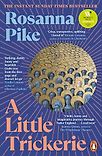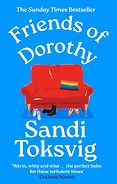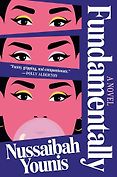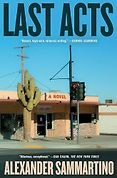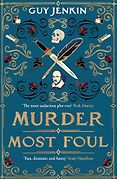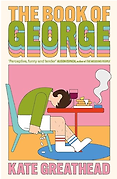What were you, the judges of the 2025 Wodehouse Prize, looking for, when you were looking for the funniest books of the year?
It’s an interesting question, isn’t it? We’ve discussed this a lot, because we had a fantastic range of submissions.
It’s a question of looking at what constitutes a comic novel. We read a lot of novels that were superb novels with elements of humour, but which were not necessarily ‘comic novels.’ We do have a wide-ranging short list, but there is humour throughout these books, both in the characters that the authors have created and the way they move through the world—and also in how the authors use language to convey that comic effect.
In the end, that’s what we were looking for: books that would occasionally make us laugh out loud, but also books that, by the end, would make us feel we’d been entertained.
Some of them are dealing with dark subject matter, but are still funny. It is such a subjective thing, humour, but we came to an agreement on what we felt was the spirit of the prize—that Wodehousian sense of humour.
Did you notice any trends among the submissions?
We had a lot of entries from women writers, quite a number of which were looking at midlife, particularly family life. What you might call a kind of Motherland sensibility—the comedy inherent in the shit women put up with through life. There was quite a lot of that. There were a few books dealing with topical issues, a few historical ones… but it was good to see so many submissions by women.
Well, let’s look at the novels that made the shortlist this year—which is eight books long. Shall we start with A Little Trickerie by Rosanna Pike, which you’ve previously described as a “Chaucerian romp.”
It’s a fantastic book. We’ve got two historical novels on the shortlist this year, and they are quite different in approach. This one I love: it’s a debut novel set in the Middle Ages in England. It’s narrated by a young girl, Tibb, who is very put-upon—a vagrant who is looking after her mother. Vagrancy is a capital offense, so she has to stay on the run.
It’s written in this extraordinary register. The sensibility is very Chaucerian. There’s low humour, bawdiness, slapstick, and it is all set within this world where people want to believe in miracles. Tibb falls in with a group of travelling players, who come up with a way to confect a miracle.
She is such a winning character. Also, the language is so clever—it’s not exactly Middle English, certainly not contemporary, but a mixture of both. That’s a real gift that the author has. There are lots of lovely little comic incidents and vignettes all the way through the book, and it has real heart.
This is a character who wants to find a place to belong, that’s a big part of it. Pike tackles aspects of homophobia and prejudice—things that were taken for granted at the time—and she has a really good handle on that period of history without making it too heavy-handed. I think it’s beautifully done.
Fantastic. Next up, we have Sandi Toksvig’s Friends of Dorothy. Great title. Could you tell us more?
This is the most ‘comic’ of the novels, in the sense that it is not obviously dealing with serious issues. It’s a light, character-based comedy, a warm-hearted book about a young female couple, Stevie and Amber, who get married and buy a new house, but the previous resident of the house—an old lady called Dorothy—refuses to leave. Then it’s an unfolding of the relationship between these characters and their supporting casts that join them.
The writing is very funny. There’s some lovely, witty dialogue. And moments of visual comedy—you can really picture this as a sitcom. Again, it’s very warm-hearted.
Do you get a sense of Toksvig’s voice coming through? For the benefit of our international readers, Sandi Toksvig is a very well-known television personality.
Absolutely. She’s almost sending herself up. There’s a point, quite early in the book, when Stevie is concerned about her wife wanting children, and she thinks to herself: lesbians can have children, there’s that one off the telly who has loads. So, a little Sandi cameo. If you can hear her voice, you will definitely find it in this book.
Next up, Fundamentally by Nussaibah Younis, which has appeared on our site several times because it has been very successful and appeared on lots of shortlists.
Yes, it’s terrific and just won the Comedy Women in Print Prize this week. Again, this is a debut novel, but what an extraordinary voice!
Younis has a phenomenal backstory. She did work for an NGO in Iraq, in a programme with former ISIS women. That’s the setting for this novel, which wouldn’t seem to obviously lend itself to comedy. But she has a dry, funny, sharp, and often quite rude way of writing.
Nadia is the main character who has gone to Iraq without much forethought. She’s gone to escape a break-up and finds herself running this programme to deradicalize ISIS brides. Through this, she meets an East London teenager who ran off to join ISIS in search of adventure, and finds she has got a lot in common with this young woman. And there’s a suspense plot in there as well.
There is substance to this one, because it is dealing with really quite serious questions. Younis has some really smart insights into the do-gooding of the UN, and a part of history where there has been real tragedy and brutality. Yet she brings out that dark humour, a sort of gallows humour that people will use in difficult situations. You can feel the authenticity of it.
I agree. It’s been great to see this book flying. But let me keep us galloping on, because it’s a long shortlist. Can we talk about Alexander Sammartino’s Last Acts?
Again, a first novel. It has a very American sensibility. We start off with what feels like quite an unpromising situation: a man, David Rizzio, in midlife, flailing in debt. He owns a gun shop that is going under. He’s got himself in trouble through various financial Ponzi schemes. His son is a recovering heroin addict who, at the beginning of the book, almost dies of an overdose. David feels there is almost a miraculous aspect to his son’s survival, although they are both pretty unhappy characters at the beginning.
So David decides he is going to make the greatest commercial for his gun shop. The comedy is there in a very understated humour, sharp observation about certain aspects of American life and the characters that surround them. It’s more of a slow burn, this one. The characters get their hooks into you.
As well as being funny, it’s also quite painful. You do start to really care about these characters by the end of it, absolutely.
It’s nice to have such range in the shortlist. The books really feel quite different in terms of subject matter and style and setting.
Yes, that’s what has been really interesting about this shortlist. We have a couple of brilliant American titles, a couple set in different cultural backgrounds, and in different historical periods. It’s a good cross-section that we’ve come up with, I think.
Yes, let’s go historical again next with Murder Most Foul by Guy Jenkin.
Another debut novel, although he’s not a new writer. Guy Jenkin is a screenwriter who has worked on various TV shows people will be familiar with.
This book is set in a period of history that has been very well worked. It’s about the murder of Christopher Marlowe. William Shakespeare is one of his main characters, and with Marlowe’s sister, they become a sort of detective duo, because they are not convinced by the official explanation for why Marlowe was stabbed in the eye in Deptford. There’s an on-off romance between them as well.
What’s entertaining about this one is that he doesn’t attempt in any way to make it sound historical, although he’s clearly done the background research. Unlike Rosanna Pike’s book, it’s all written in very contemporary dialogue, and they are presented as characters that we might recognise, that you might run into in the pub.
So there’s something in the jolt between these characters, very familiar as historical figures, and turns of phrase that make them sound recognisable to us. The comedy is found in that—how these people become heroes in a comic detective fiction.
Again, there are lots of episodic scenes you can picture unfolding on screen. He has a very vivid way of depicting that world while making it feel familiar to us. He has, from screenwriting experience, a knack for comic timing, reincorporation, and all these little tricks of how to make a scene funny.
I’ll move our discussion on to Kate Greathead’s The Book of George.
There’s a quote on the book from The Washington Post that says: “If you’re honest, you’ll admit that you’ve raised George or dated George or, worse, you are George.” I definitely think I might have done the first two.
This is almost like The Diary of a Nobody: George is a sort of everyman, a hapless figure who is drifting through his life, getting into scrapes almost by default because he doesn’t have the sense of agency to get out of them. He misses his dad’s death because he has gone on a road trip by mistake with his friends. He’s in a relationship that he’s not very interested in because he can’t get the motivation to leave it. He’s a figure who is detached from his own life.
Again, it’s very American, but in a way that is recognisable, I think, to everybody. He’s an everyman for the 2020s, I guess. There are wonderful little things, like he has a panic attack at work and has to go to hospital, where he realises that he has forgotten to get health insurance, so he gets a huge bill for this, and so in response to being frustrated by this hospital bill, he punches a wall, breaks his hand, and gets another hospital bill. There’s a very sitcom aspect to it—a very ordinary guy who gets himself into situations because he can’t be bothered to get himself out of them.
It’s very character driven. He’s surrounded by women who are smarter than he is, but he seems to have an easier path through life. It’s very witty in how it’s written.
Next, we should talk about The Persians by Sanam Mahloudji.
Again, a debut novel. It’s set in contemporary America. Or that’s where it begins, but it is dealing with the aftermath of the Iranian Revolution. You have a family now based in America, but the ripples of what happened in the 1970s are still being felt through their family.
When we spoke to Kit de Waal about the shortlist for the 2025 Women’s Prize, she described this family as ‘the Kardashians of Aspen.’
Right. There are a lot of strong women in this book. They live the high life. But there are lots of fractured family dynamics, which is always a rich source of humour. And sharp dialogue, the repartee between them. It’s a family situation that goes badly wrong, with all of this history woven through it. So, again, it’s interesting because it deals with serious politics, a family who were significant in Iran, and who are now trying to recover that sense of whether or not they matter in contemporary America. But it’s the characters you get most involved with.
I think that brings us to the final book on the shortlist, Richard Ayoade’s The Unfinished Harauld Hughes.
Obviously, he is a brilliant writer and people will know him from TV comedy. This is maybe not necessarily what you would expect from Richard Ayoade, but it’s such a clever idea. It’s a spoof biography. In fact, one of the other judges said they found it in the biography section in a bookshop—a person in the bookshop clearly hadn’t worked out it was a parody. But it certainly is.
The premise is that Richard Ayoade, the narrator, a version of the real Ayoade, is trying to write the biography of a late 20th-century writer, Harauld Hughes, who is clearly a cross between Ted Hughes and Harold Pinter, that type of literary icon. Someone has told the narrator, Richard Ayoade, that they look similar, so he starts trying to put together this biography. It’s a pitch-perfect parody of a particular time in English letters, and of the way that a certain type of man was lionised. He has such a good, clever line of spoofing that type of writing, the poetry and the incomprehensible plays of the second half of the 20th century.
I don’t know if this has as broad an appeal as some of the other books, but the wordplay is incredibly clever. It does help if you know something about that literary scene. But he has such a good ear for comic language—this is a book that will make you laugh out loud.
He’s such an inventive writer. I love his films too. It’s great to see him working in different media.
He’s really multi-talented. It’s not what I would have expected him to write, but there is a self-conscious cleverness that is a real pleasure to read.
That brings us to the end of the shortlist. Did the judging process leave you feeling optimistic about comic writing today?
Definitely. It was a job to get from our unofficial longlist to the shortlist. There was a lot of argument in narrowing that down to the books we have here. There were other books some of us felt very passionately about.
I think, in general, there’s an idea that comic writing is a poor cousin of literary writing, but this shortlist shows that, actually, you can do both. You can look at serious subject matter, tackle historical episodes, and also have fun with characters. These are books that will pull the reader in and get the reader to care about the outcome for the characters. It’s not just a series of jokes.
These books show the potential and scope and range of comic writing in English. We’ve been very lucky this year.
The winners of both the Bollinger Everyman Wodehouse Prize for Comic Fiction and the Vintage Bollinger Prize will be announced on 1st December.
wodehouseprize.com
Interview by Cal Flyn, Deputy Editor
November 18, 2025. Updated: December 7, 2025
Five Books aims to keep its book recommendations and interviews up to date. If you are the interviewee and would like to update your choice of books (or even just what you say about them) please email us at [email protected]
Five Books interviews are expensive to produce. If you've enjoyed this interview, please support us by donating a small amount.

